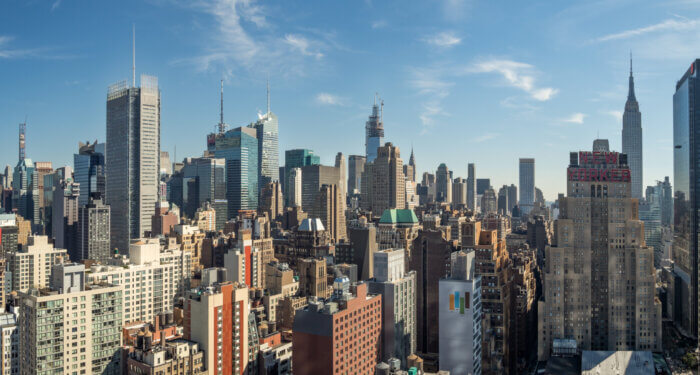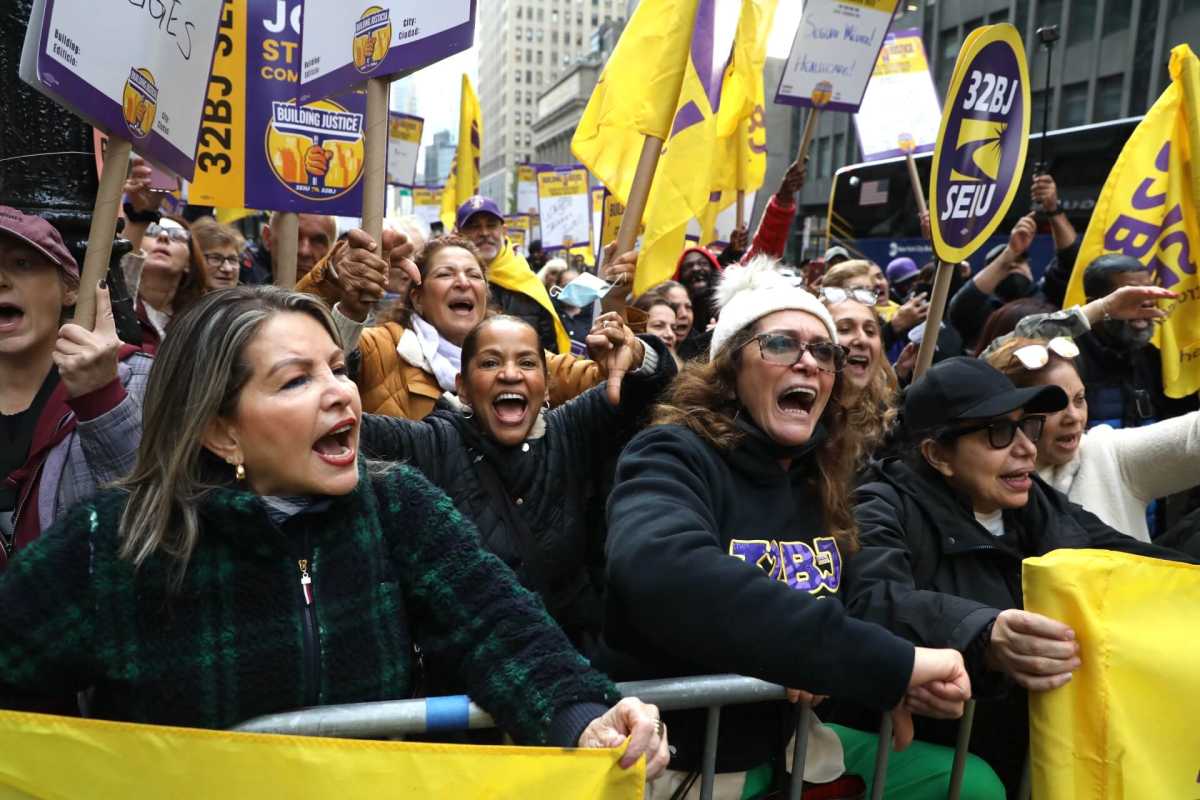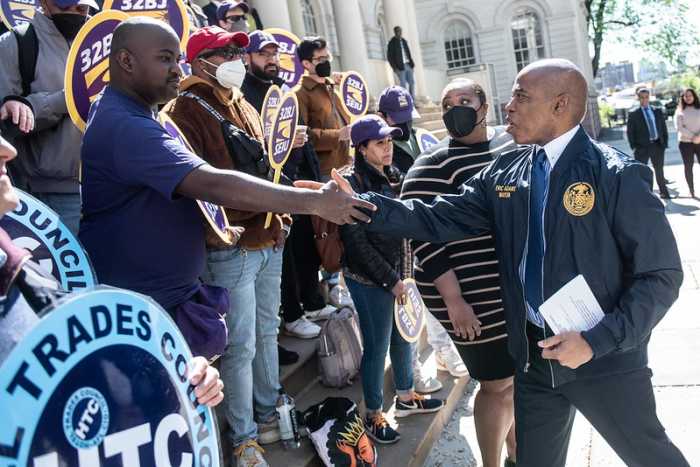Contract negotiations between tens of thousands of unionized building service workers and their employers started with a bang on Thursday as hundreds of cleaners, porters, and handypersons rallied in downtown Manhattan.
The workers are members of SEIU local 32BJ, which represents about 80,000 building service workers throughout New York City, including 20,000 commercial building workers. At least 3,300 union members live in Brooklyn.
Negotiations between 32BJ and the Realty Advisory Board on Labor Relations Inc. — an organization which represents the city’s major commercial building owners, managers and cleaning contractors — began with union representatives advocating for wage increases and the protection of health insurance for workers.
The current four year contract with between the board and 32BJ is set to expire Dec. 31, which the union says will put the livelihood and health of the workers at risk if they are unable to negotiate new wages that reflect the skyrocketing cost of living in the city.
“The contract covers 20,000 cleaners that are in office buildings, higher [education], workers who clean Rockefeller Center, Hudson Yards, Empire State Building, Port Authority, Central Station, World Trade Center, NYU, MoMA — the vast majority of offices and institutional facilities across the city,” 32BJ president Manny Pastreich told Brooklyn Paper.
Preparing for the difficult bargaining period, Pastreich acknowledged that after the COVID-19 pandemic, many commercial building owners are struggling to keep their buildings occupied with the shift to remote working and the cost of rent and upkeep of office buildings. Earlier this year, office vacancy rates in Manhattan reached historic highs. In Brooklyn, the number of commercial leases plummeted, with office vacancy rates at 21%.
Of the 20,000 32BJ commercial building members, more than 7,000 were laid off during the pandemic. The layoffs, coupled with the rise of inflation, has resulted in the union losing some of the influence it once had.
“We’ve actually lost buying power over the course of a four-year agreement,” Pastreich said. “Because of inflation — prices of everything from rent to food, to whatever it takes to take care of your family have gone up. So, you know, those two things are going to make this a very difficult bargaining.”
Many members of 32BJ were essential workers who continued to work throughout the COVID-19 pandemic to clean and sanitize buildings, risking their own health in the process.
Thank you to all @32BJSEIU schools cleaners doing the hard work of keeping our schools safe, healthy and operational. Here pictured are Jamar Lewis, Ethan Macías, James Lee and Phillip David, disinfecting PS132 after a confirmed case of #COVID19. ✊🏼 Thank a janitor today! pic.twitter.com/srfiGhwGRC
— 32BJ SEIU /// #BuildingJustice 🧹✊🏽 (@32BJSEIU) March 15, 2020
Ena Softley — a building cleaner and member of the contract bargaining committee who lives in Flatbush — experienced the risks firsthand when she contracted COVID early on in the pandemic and spent three months seriously ill.
“It was so scary, I got COVID in 2020 and there [was] no medicine, there was no method to take care of COVID, we just died,” Softley told Brooklyn Paper. “To recover from COVID, my doctor — thank god because of our health care that we have, I could have a private physician treat me — and he told me not to go back to work because my body couldn’t take another test of the virus, but I had to go back to work.”
Softley didn’t just want to go back to work to make money to take care of herself and her family, she said. She felt that as a representative of her union, she had to be reliable and take care of the tenants in the building she works in.
However, as 32BJ and the Realty Advisory Board enter negotiations for the next four-year contract, Softley is disenchanted by the idea that she and other union members will have to advocate for what she believes is “basic dignity.”
“It’s disappointing because all we ask for is that we are being treated, given the same dignity and respect and the sacrifices as we have given to their tenants,” said Softley. “And we really would like them to acknowledge and to recognize all of the sacrifices that we’ve made during COVID, and the fight for us now is to keep our healthcare because many of our co-workers died. Even though we had healthcare. And if we didn’t have healthcare, I would have died.”
In New York City, the real estate industry has cut labor costs in response to the pandemic and increased building vacancies by reducing the number of commercial cleaners in the workforce by 2,000 positions. Union reps say that at the same time as the workforce reduction, commercial rent prices have increased and job growth has surpassed the levels in 2019, suggesting that the real estate market should be able to support the 32BJ members and their demands.
However, according to Howard Rothschild, the president of the Realty Advisory Board on Labor Relations, the industry is still facing significant challenges which may prevent the board from accommodating all the demands from 32BJ.

“COVID has created a new paradigm for remote work, with the vast majority of tenants currently in the office three days per week, or less,” Rothschild said in a statement following the first negotiation session on Thursday. “Vacancy rates have correspondingly skyrocketed and are projected to remain that way for years to come. Without changes to increase flexibility in our [collective bargaining agreement], the future of the industry and our workers is in jeopardy. Now is time for the union and industry to roll up our sleeves and come together to negotiate a contract that will provide for a sustainable future.”
If demands are not met, 32BJ members are prepared to strike, according to Pastreich and Softley.
“We have 500 strike captains in NYC who are preparing with their coworkers,” Pastreich said in October, before negotiations began. “You know, we always feel that the best way to avoid a strike is be ready for them.”
Union members have been told to prepare for a potential strike for about a year now with the union offering some strike benefits to support workers financially if the need arises. 32BJ members previously engaged in a labor strike back in 1991. In 2019, as contract negotiations dragged, union members voted to authorize a strike, but successfully negotiated a contract before a strike began.
This year has been particularly significant for labor movements nationally, and Pastreich and 32BJ members believe that the negotiations are a crucial avenue of advocating for themselves and their communities.
“It’s always important that workers are treated well and can take care of their families. But at this moment of change, I would say it’s critical and I think that’s why we’re seeing the activity in labor right now at a higher level.” Pastreich said. “When industries go through change, are the people who are the backbone of the buildings, the backbone of the city gonna get taken care of or discarded?”

























